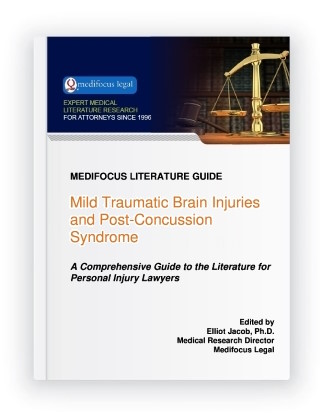Mild Traumatic Brain Injuries and Post-Concussion SyndromeA Comprehensive Guide to the Literature for Personal Injury Lawyers
Publisher: Medifocus Legal
Publication Date: September 18, 2024
Number of Pages: 145
A Comprehensive Guide to the Literature for Personal Injury Lawyers
Publisher: Medifocus LegalPublication Date: September 18, 2024
Number of Pages: 145
While most individuals recover from a concussion within a few days to weeks, some continue to experience symptoms of post-concussion syndrome for a prolonged period of time. These ongoing symptoms include headaches, dizziness, cognitive difficulties, and emotional disturbances such as anxiety and depression. Although the exact cause of post-concussion syndrome is not fully understood, it is believed to involve a combination of physical, psychological, and social factors.
In litigating mTBI cases, several key issues often arise as points of dispute between plaintiff and defense attorneys. Most commonly, these issues include causation, extent and severity of injury, symptom validity, long-term impact, and amount of damages. The issues in dispute require careful examination of medical evidence, expert testimony, and the circumstances surrounding the injury, making mTBI cases complex and often contentious in litigation.
Medical literature often plays a crucial role in litigating mTBI cases by providing evidence-based information that can support or challenge claims made by both plaintiffs and defense attorneys. A few key aspects of how medical literature is utilized in these cases includes:
- Establishing Causation - Medical literature can help establish a connection between the incident and the resulting mTBI. Studies that outline the mechanisms of injury and the typical symptoms associated with a mTBI can be referenced to support claims regarding causation.
- Understanding Symptoms and Prognosis - Research articles and clinical studies can provide insights into the common symptoms of mTBI, their duration, and potential long-term effects. This information can be critical in assessing the validity of the plaintiff's reported symptoms and in understanding the expected recovery trajectory.
- Expert Testimony - Medical literature serves as a foundation for expert witnesses who are called to testify in court. These experts often rely on peer-reviewed studies to substantiate their opinions regarding the nature of the injury, its effects, and the appropriateness of specific treatment recommendations.
- Assessing Damages - The literature can provide data on the economic impact of a mTBI, including costs associated with medical treatment, rehabilitation, and lost productivity. This information can be used to support claims for damages or to argue against inflated claims.
- Influencing Jury Perception - Well-documented medical literature can help shape the narrative presented to the jury. Clear, credible studies can enhance the persuasiveness of arguments made by either side, influencing how jurors perceive the validity of the claims.
The MediFocus Literature Guide to Mild Traumatic Brain Injuries and Post-Concussion Syndrome is a unique, comprehensive reference guide to the medical literature designed to help personal injury lawyers develop an in-depth understanding of mTBI and post-concussion syndrome and the often significant cognitive behavioral, and social consequences associated with these injuries.
The MediFocus Literature Guide to Mild Traumatic Brain Injuries and Post-Concussion Syndrome is available both as a soft-cover book and as a PDF download. Order your copy today. Please see the side panel for more information.
 |
- A comprehensive bibliography of 176 journal article references indexed in MEDLINE published in well respected medical and scientific journals.
- Online access to the abstracts (summaries) of the articles.
- Online access to the free full-text version of 50 articles.
- Links to full-text sources of other articles that are available for purchase directly from individual journal publishers.
- A unique "Author Directory" consisting of the names and institutional affiliations of experts who have published and have specialized knowledge about Mild Traumatic Brain Injuries and Post-Concussion Syndrome. The "Author Directory" is a valuable resource for quickly identifying and locating experts for case reviews, opinions, and testimony.
Select examples of topics that are covered by the articles referenced in this Guidebook include:
- A narrative review of risk factors and predictors for poor outcome and prolonged recovery after a mild traumatic brain injury.
- Emergency Department Risk Factors for Post-Concussion Syndrome After Mild Traumatic Brain Injury: A Systematic Review.
- Mild Traumatic Brain Injury as a Risk Factor for Parkinsonism, Tics, and Akathisia: A Systematic Review and Meta-Analysis.
- Prognostic factors for persistent symptoms in adults with mild traumatic brain injury: an overview of systematic reviews.
- What tests and measures accurately diagnose persisting post-concussive symptoms in children, adolescents and adults following sport-related concussion? A systematic review.
- Cognitive Outcome After Complicated Mild Traumatic Brain Injury: A Literature Review and Meta-Analysis.
- Post-Concussion Symptoms and Disability in Adults With Mild Traumatic Brain Injury: A Systematic Review and Meta-Analysis.
- Volumetric MRI Findings in Mild Traumatic Brain Injury and Neuropsychological Outcome.
- A Systematic Review of Treatments of Post-Concussion Symptoms.
- Investigating the relationship between mild traumatic brain injury and Alzheimer's disease and related dementias: a systematic review.
- Mental Health Outcomes Across the Lifespan in Individuals With Persistent Post-Concussion Symptoms: A Scoping Review.
- Neuropsychological and neuropsychiatric recovery from mild traumatic brain injury.
- Autonomic dysfunction in adults following mild traumatic brain injury: A systematic review.
- An updated review of the prevalence of invalid performance on the Immediate Post-Concussion and Cognitive Testing (ImPACT).
- Persistent post-concussive symptoms: A model of predisposing, precipitating, and perpetuating factors.
- Diffusion and functional MRI findings and their relationship to behaviour in postconcussion syndrome: a scoping review.
- Clinical Evaluation and Treatment of Patients with Postconcussion Syndrome.
- Neurorehabilitation of Persistent Sport-Related Post-Concussion Syndrome.
- Mild traumatic brain injury: Is DTI ready for the courtroom?
- Concussion-Mild Traumatic Brain Injury: Recoverable Injury with Potential for Serious Sequelae.
is available in two formats: | |
Order by Phone:To order by phone, please call: Order by Mail:To order by mail, please print and complete this Order Form | |

